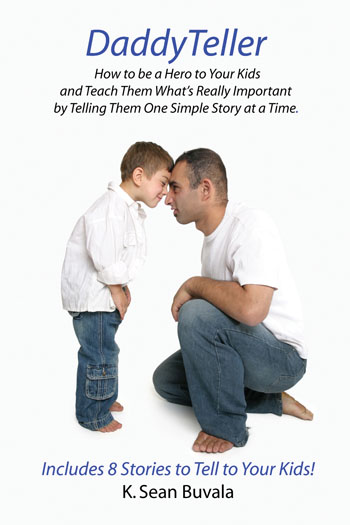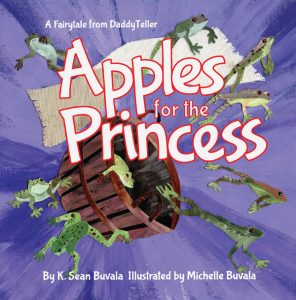PUBLISHED OCTOBER 2017
by K. Sean Buvala, Author, DADDYTELLER
-

K. Sean Buvala
Your book can become a tool for more speaking opportunities. Here are 10 candid tips to guide you in the right direction.
Many years ago, I had a business lunch with some decision makers for a local organization. They were meeting with me as a favor to a mutual friend, and, honestly, I think they were more interested in the meal than in one more consultant meeting.
As we began, I placed information packets next to each of them. On top of the packets, I put down what was then the only book I had published,
Daddyteller, which was not even related to the subject of our meeting.
As the meal was ordered and the talking began, one of my tablemates picked up her copy of my book. She touched the cover and said, “Oh! You’re an author.”
Suddenly, I had changed in her eyes. I could feel it. I was no longer just another consultant. I was an author with an actual, real-to-touch book.
In one moment, my image, authority, and legitimacy changed. I, an Author, had earned my metaphorical seat at the literal table at which I was sitting.
Authors get booked, and you can use your nonfiction book to create more
speaking opportunities. Here are 10 tips and thoughts to help you do more.
1. Start with a good book.
Write about a subject you love for the sake of writing it. Write to help your target audience, not sell to them. Afterwards, think about sales. Your book needs to look professional. I know that an attractive, interesting cover caught the eye of my lunch mates.
2. Give that book away.
Your book is a tool to help you connect the world with your message. Your book is also not your baby. Let go. It is the best business card you will ever have. Make it a part of your marketing budget to generously and liberally give copies of your books away to decision makers and, probably where it most counts, their support staff.
3. Marketing is your friend.
You know all the facts about how many books are published each year. To be seen swimming in that ocean of books, you will need to embrace the reality of marketing via social media, direct mail, blogging, and the like.
4. Make appearances.

K. Sean Buvala's DADDYTELLER
Don’t just hide behind your computer while you are doing your marketing. Actively seek out opportunities to make presentations, teach classes, and lead workshops in your area of expertise. Always refer to your books in these presentations. Take only a brief moment of the whole event to offer your products, delivering quality content rather than advertising. Printed promotional materials at these events are important.
It’s OK to work for free if you feel you have found a great group that aligns with your work. Don’t be too quick to use the old “die of exposure” retort. You never know which decision maker, with a generous budget to book speakers, is sitting in the audience at your free events. Don’t you want it to be you and your book they think about after the meeting?
People expect speakers to offer books. In those moments after a speaking engagement, right before that time where people wish to speak to you one-on-one, be sure you mention, “I’d be happy to take questions afterward. Let’s meet back at my book table.”
5. Use your books to make more money in a contract.
I’ve seen how a few free copies of my training books or kids’ books can do great things in the hands of a school administrator, who so enjoyed my books that they hired me for more than a dozen of well-paying parent-training sessions. In addition, they purchased (at near retail cost) and distributed 1,400 copies of my books to families in that program. That same administrator, happy with so many books I had written, then booked me for a teacher in-service, buying 200 more copies of other books for those teachers.
6. Discount books as needed.
It’s important to remember that books have a perceived value to your fans and sponsors. What you sell for $10 retail does not cost you that much. In that cost versus retail space, you have lots of room to negotiate. Do it.
Sometimes, to secure a contract, I will throw in several hundred copies of a book at or near cost in order to finalize a contract that might be teetering on the edge. It is worth your time to just make $1 or $2 per book in order to secure a good stipend for consulting.
7. Discount books all the way.

APPLES FOR THE PRINCESS by K. Sean Buvala
In booking contracts, don’t reduce your fees. Rather, add value to the contract. If I am faced with losing a contract over the cost of some books, I may
even give the books away for free. “So, Sponsor, our books usually sell for $10. If you book us, we’ll give you the 100 books you need, $1,000 worth, at no additional charges.”
Would you give $200 worth of books to secure a $1,500 speaking gig? I often have.
For some smaller venues, if the sponsoring organization will purchase an agreed-upon number of books at full price, I’ll come do an associated workshop for no additional charge. Use your own numbers here, balancing your heart’s passion for speaking with the profit you will make from the full-price book sales.
8. Be patient.
Think long term, too. I’d like to tell you that my lunch date above resulted in an immediate booking. It did not. However, the person who loved my cover did later book me for a major project several years later. The book-related seed you plant today in the form of freely given-away books may take some time to germinate.
9. Don’t worry about sales rank.
It’s popular to judge the success of a book or its author by the sales rank at places such as Amazon. My sales ranks for my books are low on that site. But that’s OK. I am teaching workshops and events in subjects that make my soul happy, while also selling books hundreds at a time. I understand that ranking may be critical for some authors, but in this books-as-tools model, it’s simply not as important.
10. Write more books.
Before I wrote my first book in 2006, I had already been speaking and teaching nationally for 20 years. Humbly, let me say that in my areas of focus, I am an expert. Now, 11 years later, I have written more books. I can tell you it is easier to be booked for events and to make more profit from the events as a published author than anything else I have ever done. Write more books and you'll sell more books and get more bookings.
K. Sean Buvala has been engaged in the oral storytelling tradition since 1986 as a performer, speaker, and author. He started his work by accidentally using active storytelling to convert a classroom of slightly (but comically) homicidal eighth-grade teenagers from angry kids to storytelling practitioners themselves. Learn more at seantells.com.
Learn more about this topic:
Events